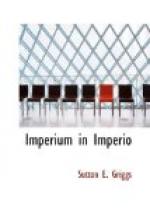Added to his great popularity because of his talents, there sprang up for him personal attachments, marvelous in depth. He rose to the full measure of the responsibilities of his commanding position, and more than justified the fondest anticipations of his friends and admirers. In the meanwhile he kept an observant eye upon the trend of events in the United States, and his fingers were ever on the pulse of the Imperium. All of the evils complained of by the Imperium continued unabated; in fact, they seemed to multiply and grow instead of diminishing.
Bernard started a secret newspaper whose business it was to chronicle every fresh discrimination, every new act of oppression, every additional unlawful assault upon the property, the liberty or the lives of any of the members of the Imperium. This was an illustrated journal, and pictures of horrors, commented upon in burning words, spread fire-brands everywhere in the ranks of the Imperium. Only members of the Imperium had access to this fiery journal.
At length an insurrection broke out in Cuba, and the whole Imperium watched this struggle with keenest interest, as the Cubans were in a large measure negroes. In proportion as the Cubans drew near to their freedom, the fever of hope correspondingly rose in the veins of the Imperium. The United States of America sent a war ship to Cuba. One night while the sailors slept in fancied security, some powerful engine of destruction demolished the vessel and ended the lives of some 266 American seamen.
A board of inquiry was sent by the United States Government to the scene of the disaster, and, after a careful investigation of a most thorough character, decided that the explosion was not internal and accidental but external and by design. This finding made war between the United States and Spain practically inevitable.
While the whole nation was in the throes of war excitement, a terrible tragedy occurred. President McKinley had appointed Mr. Felix A. Cook, a colored man of ability, culture and refinement as postmaster of Lake City, South Carolina. The white citizens of this place made no protest against the appointment and all was deemed satisfactory.
One morning the country awoke to be horrified with the news that Mr. Cook’s home had been assaulted at night by a mob of white demons in human form. The mob set fire to the house while the occupants slept, and when Mr. Cook with his family endeavored to escape from the flames he was riddled with bullets and killed, and his wife and children were wounded. And the sole offense for which this dastardly crime was perpetrated, was that he decided to accept the honor which the government conferred upon him in appointing him postmaster of a village of 300 inhabitants. It was the color of his skin that made this acceptance odious in the eyes of his Anglo-Saxon neighbors!
This incident naturally aroused as much indignation among the members of the Imperium as did the destruction of the war ship in the bosoms of the Anglo-Saxons of the United States. All things considered, Bernard regarded this as the most opportune moment for the Imperium to meet and act upon the whole question of the relationship of the negro race to the Anglo-Saxons.




